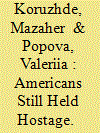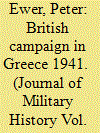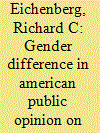|
|
|
Sort Order |
|
|
|
Items / Page
|
|
|
|
|
|
|
| Srl | Item |
| 1 |
ID:
186975


|
|
|
|
|
| Summary/Abstract |
MAZAHER KORUZHDE and VALERIIA POPOVA examine the effect of the Iran hostage crisis on American public opinion on the 2015 Iran nuclear deal. They argue that Americans who were “old enough” to share a collective memory of the crisis form a “crisis generation” and are significantly less likely to approve of the deal, regardless of their party and ideological orientations.
|
|
|
|
|
|
|
|
|
|
|
|
|
|
|
|
| 2 |
ID:
116786


|
|
|
|
|
| Publication |
2012.
|
| Summary/Abstract |
This article looks afresh at the decision by Britain to despatch an expeditionary force to Greece in 1941 to oppose the much-anticipated decision by Hitler, to end by German invasion the inept Italian campaign against Athens. The existing work on this topic emphasises the geo-political motives behind the campaign, especially Churchill's need to impress American public opinion by going to the aid of the Greeks, often with an assumption that British military leaders committed themselves to the venture against their better judgement. What these accounts overlook is what British planners thought was operationally possible. This article is based on new archival research, which indicates that key British leaders, throughout the chain of command, thought Greek topography would prevent the Wehrmacht from repeating the success of armoured warfare achieved by the Germans in France. In considering this material, the article sheds new light on the failure of British military leaders to fully understand the possibilities of armoured warfare, and thus adds to our understanding of the doctrinal reasons for poor British battlefield performance in the 1940-42 period more generally.
|
|
|
|
|
|
|
|
|
|
|
|
|
|
|
|
| 3 |
ID:
175294


|
|
|
|
|
| Summary/Abstract |
For nearly 75 years, scholars of American public opinion have sought to measure whites’ attitudes toward blacks: social scientists have invented and revised ways to measure what we could refer to as “racial prejudice.” With each revision, scholars who believe they have captured new forms of racial animus are met with opposition from those who believe that old-fashioned anti-black affect is a thing of the past. We directly answer these claims by collecting a surfeit of attitudinal measures to simultaneously estimate the relationship between cognitive beliefs about the racial status quo and emotional reactions to racism. First, we uncover that two higher-order dimensions undergird whites’ racial attitudes. Second, we validate a four-item version of our new battery using the 2016 Cooperative Congressional Election Study.
|
|
|
|
|
|
|
|
|
|
|
|
|
|
|
|
| 4 |
ID:
146189


|
|
|
|
|
| Summary/Abstract |
Recent scholarship indicates that gender correlates strongly with Americans' attitudes toward the use of military force. However, most of its evidence derives from the study of major wars, and the field needs more historical research to evaluate the evolution of gender difference over time. I redress these limitations by updating and extending my earlier (2003) analysis of public support for the use of force during the 1990s. I analyze 965 individual survey questions concerning the use of US military force in twenty-four historical episodes, beginning in 1982 with military aid to El Salvador and continuing through the recent wars in Afghanistan, Iraq, Libya, and Syria. I find that substantial gender difference characterizes a large number of historical episodes and types of military action. Nonetheless, the magnitude of gender difference varies substantially; in many cases, a substantial percentage of women supports the use of force. The difference between men and women varies most with the salience and level of violence, and women are more sensitive to humanitarian concerns. Women display more sensitivity to casualties in some historical cases, but during the wars in Iraq and Afghanistan, the casualty sensitivity of men gradually increased as the wars dragged on, and gender differences therefore decreased. Thus, I argue that scholars should turn their attention to studying individual-level differences between and among men and women in support for using military force. I also discuss the political and policy implications of the findings.
|
|
|
|
|
|
|
|
|
|
|
|
|
|
|
|
| 5 |
ID:
147562


|
|
|
|
|
| Summary/Abstract |
Since the end of the Vietnam War, the United States has refrained from the widespread, intentional targeting of civilian populations in times of war. Public opinion polls seem to reflect a marked decline in American support for targeting foreign civilians since that time. Drawing on original public opinion surveys, as well as other historical material, this essay explores several explanations for these changes. Although there is some evidence that the public's views about the morality of civilian targeting have shifted, I argue that two other explanations also play an important role in the changes in the conduct of American wars. First, a mounting skepticism, especially within the U.S. military, about the efficacy of killing civilians, has undercut the primary motivation to even consider such tactics. Indeed, many U.S. military leaders now perceive that killing adversary civilians in large numbers – intentionally or unintentionally – usually backfires, making the adversary fight harder or driving more civilians to join or support the adversary's forces. Second, due to the lower stakes, and especially the dramatically lower fatality rates suffered by American troops in recent wars, the temptation to attempt to end wars quickly with a “death blow” against adversary cities has become less potent. Under certain conditions, however, a majority of Americans would still support today the kind of population bombing last practiced during World War II.
|
|
|
|
|
|
|
|
|
|
|
|
|
|
|
|
| 6 |
ID:
161428


|
|
|
|
|
| Summary/Abstract |
In this article we assess American public attitudes toward the just war principles of proportionality, due care and distinction. Consistent with the logic of proportionality, we find that Americans are less willing to inflict collateral deaths on foreign civilians when the military advantage of destroying a target is lower. Most Americans also are willing to risk the deaths of American soldiers to avert a larger number of collateral foreign civilian deaths, which accords with the due care principle. Nevertheless, we find that the public's commitments to proportionality and due care are heavily biased in favor of protecting American soldiers and promoting US national security interests. Moreover, we find little evidence that the majority of the public supports the principle of noncombatant immunity, and, contrary to just war doctrine, Americans are more likely to accept collateral deaths of foreign civilians when those civilians are described as politically sympathetic with the adversary.
|
|
|
|
|
|
|
|
|
|
|
|
|
|
|
|
|
|
|
|
|